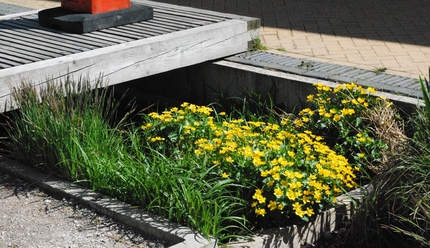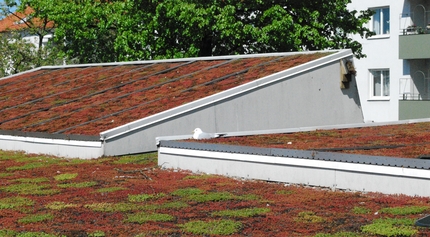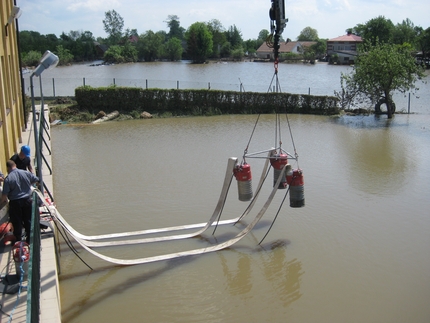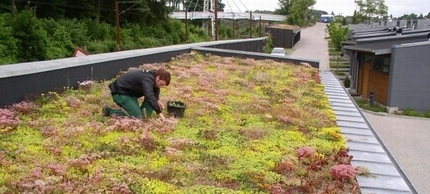Green Urban Transformers, Master of Disaster Management, Garden and Park Engineering, and Roof Gardener. These are just a few of the new training programmes offered in Denmark focussing on climate change
Predictions of the future climate in Denmark indicate that we will be seeing more and more extreme weather events. If we are not well prepared, this could have considerable implications for both nature and society. Specialists with knowledge on how to prevent, manage and adapt to the new conditions will be in great demand. Therefore, an increasing number of practical and academic training programmes are emerging, all offering teaching in various facets of climate change adaptation.
Garden and Park Engineering
LIFE-Faculty of Life Sciences, University of Copenhagen, offers the Garden and Park Engineering programme; a professional bachelor education programme. The programme takes four years to complete and includes two internships.
The Garden and Park Engineering programme is a concrete, career-oriented programme, which can help facilitate adaptation of urban environments to a changing climate. In the programme, students are prepared for the task of ensuring we have a society with space for both man and nature to thrive - also during more extreme weather events in the climate of the future. During the course of the programme, students work creatively and solution-oriented on the basis of a technical and theoretical introduction to subjects such as soil, water, plant life, and their interconnectedness with the climate of yesterday, today and tomorrow.


Photo: Susanne Ogstrup. From a visit to Augustenborg's Botanical Roof Garden in Sweden. Top: Green rainwater collection. Bottom: Green roofs. Both photos illustrate elements which, by using nature, can relieve the city in the event of flooding, heat waves, and poor air quality. They are good examples of what garden and park engineers can do.
Thomas G. Thaarup is studying to become a Bachelor of Forest and Landscape Engineering. However, he would have chosen the Garden and Park Engineering programme, had it existed when he began his studies. The Garden and Park Engineering programme's strong focus on urban development, in combination with nature and the environment, appeals especially to him, as well as the fact that it is both a practical and academic programme.
"I am most receptive to learning when theory and practice are coupled, when I study the relevant literature and get out and see the situations in real life. This is exactly what the future garden and park engineers will get to do," says Thomas G. Thaarup.
Many politicians and technicians often overlook the fact that nature can be a part of the solution to climate change problems. However, if such solutions are to be used, a high professional level is required in terms of planning and the scientific basis. There must also be room to think innovatively. Susanne Ogstrup, who is head of studies in the new Garden and Park Engineering programme, says:
"We have to get rid of the conventional way of thinking. Commerce and industry are looking for these qualifications, exactly because the 'old' programmes did not have this combination of an innovative/engineering approach, on the one hand, and urban planning and the natural sciences on the other."
The first bachelors of gardening and engineering will graduate in 2015. "They will not be experts, but they will have an overall understanding of the relationship between nature and society, and this understanding is necessary for our reorganisation of society to match a changing climate," says Thomas G. Thaarup.
Disaster Risk Management
The three-and-a-half-year professional bachelor education programme in Disaster Risk Management is offered by the Copenhagen-based Metropolitan University College. The first students in the programme started in August 2010. Disaster risk managers are trained to manage risks and disasters with emphasis on response, risk assessment and preparedness.
Ejgil Boye Mortensen, who is head of staff at the Danish Emergency Management Agency's decentral department in Thisted, Jutland, is not convinced the programme is comprehensive enough. Although the programme gives a basic introduction to emergency management and preparedness, the work during response in real life varies so considerably, that the necessary competencies primarily have to be acquired through practical and personal experience more than through basic training.

Source: Ejgil Boye Mortensen. The Danish Emergency Management Agency' work during deployment in Poland in the spring of 2010, when Poland was struck by extensive flooding.
However, Ejgil Boye Mortensen thinks the new programme will be a relevant choice for a mid-level manager on his/her way up in the system. The programme will also have potential for the recruitment process in the Danish Emergency Management Agency, as an admission basis for future new managers. Today, there is no proper programme which qualifies for work in the Danish Emergency Management Agency.
"We recruit people from the street, so to speak. They are perhaps school teachers or engineers, and when we have assessed that their academic level is sufficient to begin with, we teach them a whole lot more ourselves. It would be great if the new programme could do this for us," says Ejgil Boye Mortensen.
Master of Disaster
The Master of Disaster Management programme is a Master's programme at the University of Copenhagen. The programme is offered in collaboration with Lund University, Sweden. The programme can either be completed as a one-year full-time study, or it can be completed over a period of up to three years and thus combined with a full-time job.
The programme is based on a broad understanding of the disaster concept. With emphasis on disaster and recovery, the students learn to manage disasters at both strategic level and operational level. They also learn to analyse and assess risks before, during and after the disaster. The programme primarily has a global aim.
Climate change expert
The University of Copenhagen is expected to establish a new programme for postgraduate students next year under the working title 'Climate Change: Impacts, Mitigation and Adaptation (CCIMA)'. The programme is an MSc-programme which takes two years to complete, with a concluding Master's thesis.
The CCIMA will be a cross-faculty programme, where students can acquire competences and expert knowledge within climate-change-related fields. The aim of the programme will be to equip students to understand, predict and prevent climate change, as well as adapt society to climate change.
The programme is awaiting final accreditation and the first students are expected to be enrolled in 2011.
Programmes for everyone
Climate change adaptation is often addressed in the form of courses and subjects that are directed both at new students and more experienced graduates in the business community. As early as after lower secondary school (16-17 years), you can study to become a roof gardener at either Roskilde Technical School or at Green Academy, Aarhus. Here students learn to lay green roofs, which offer many climate-related effects and advantages.

Photo: Kjeld Larsen og Søn a/s Anlægsgartnere, a Danish landscape gardener company. A roof gardener working on a green roof, which has been established with climate-adapted herbs and mosses.
Finally, architects, urban planners, and others employed with urban development, can participate in the intensive continuing training course Green Urban Transformers (GUTS) at Aarhus School of Architecture. Here students learn to act strategically in a green development where, amongst other things, they work with the city's green structure in relation to climate change adaptation.